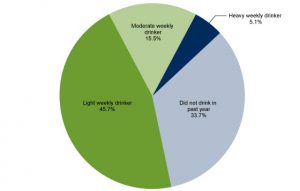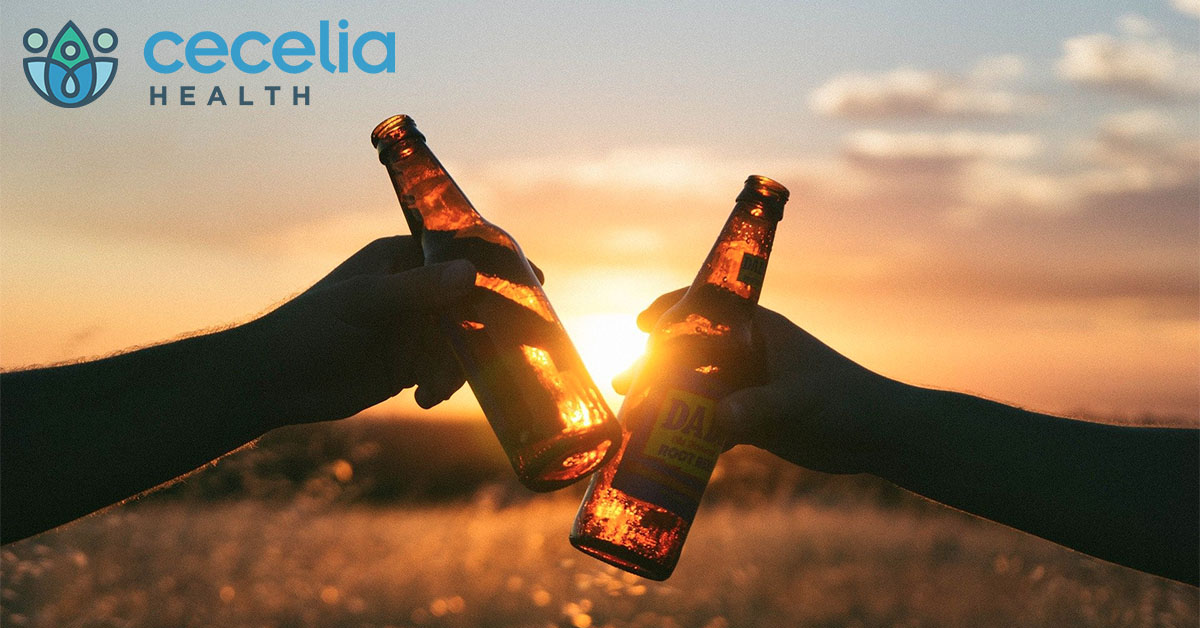Despite prohibition efforts, alcohol has quite a bit of prevalence in our society today. In fact, the graph below shows that over 68% of Americans consume alcohol regularly.

SOURCE: National Center for Health Statistics, National Health Interview Survey, 2018.
“An adult who engaged in light drinking averaged three or fewer drinks per week in the past year. An adult who engaged in moderate drinking averaged 4 to 14 drinks per week for men and 4 to 7 drinks per week for women in the past year. An adult who engaged in heavy drinking averaged more than 14 drinks per week for men and more than 7 drinks per week for women in the past year.” (Centers for Disease Prevention and Control)
It’s important to know that alcohol is metabolized by the liver. However, the liver also is responsible for releasing glucagon in times when blood glucose gets too low. The liver is not great at multitasking. If the liver is busy processing alcohol and you are experiencing low blood glucose, your liver may not be able to keep up with both tasks and secrete glucose to your bloodstream as needed. This is important to keep in mind when reaching for a cocktail.
Generally, women are recommended one alcoholic drink per day and men up to two alcoholic drinks per day. One drink is equal to five ounces of wine, 12 ounces of beer, or 1.5 ounces of liquor. Before you drink alcohol, discuss it with your doctor to come up with a plan specific to your needs and your diabetes.
As a rule of thumb, this list ranks alcohol from least likely to affect your blood glucose to most:
- Unsweetened liquors: rum, vodka, tequila, whiskey
- Champagne
- Beer/Dry Wine
- Sweet Wine
- Sweetened liquors: margaritas, daquiris, etc.
*Please note that this is generalized and does not take into account specific types/brands nor does it account for serving size of the drink. Beer, in particular, has a large variance in the amount of carbohydrate per ounce.
Tips for safely enjoying your drink:
- Eat a balanced meal before/during drinking alcohol to stabilize blood glucose
- Stay hydrated – see tips for hydration here
- Add ice to help water down the drink and extend the drinking time
- If you’re drinking at home, measure the ounces to ensure you’re keeping within serving size goals
- If you’re out at a restaurant, ask your bartender/server about serving size
Be on alert: being drunk can look and feel very similar to experiencing low blood sugar
- Always have your blood glucose meter available when you plan to drink alcohol
- Make sure you’re with someone who knows you have diabetes and what to do if you experience a low blood glucose
- Symptoms of low blood glucose: dizziness, slurred speech, cold/clammy, shaky, fast heartbeat, irritable/grouchy, confused, hungry
- Certain medications like insulin and sulfonylureas can put you at greater risk for low blood glucose
All in all, alcohol CAN be enjoyed when you have diabetes. Follow the advice from your care team and some of the tips outlined here and you’ll be on your way to enjoying a cocktail safely. Dive into more information about diabetes and alcohol consumption here from the American Diabetes Association. Cheers!
